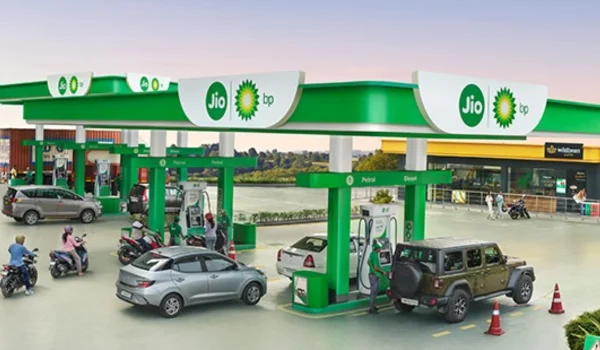Jio‑BP Mobility Ltd is a joint venture between Reliance Industries and BP, rapidly expanding its presence in India with over 1,700 retail fuel outlets across the country. Leveraging modern infrastructure, competitive pricing (discounts of ₹1–3 per litre over PSU pumps), and fuel quality recognition, Jio‑BP is positioning itself as a strong player in India’s growing ₹150‑billion fuel retail market.
In partnership with Adani Total Gas, selected stations are also being retrofitted with CNG dispensing units, expanding service offerings and consumer appeal.
💰 Investment & Cost Estimate

📊 Summary Investment Table
| Component | Estimated Cost (₹ lakh) |
| Land (owned/leased) | 20–200 depending on location |
| Construction, Civil Work | 30–150 (incl tanks & canopy) |
| Equipment (pumps, tanks, POS) | 20–50 |
| Licenses & Permits | 2–5 |
| Security Deposit | 30–35 |
| Working Capital & Operations | 10–20 |
| Total Investment (Urban) | ₹150–300 lakh (₹1.5–3 Cr) |
| Total Investment (Rural) | ₹50–75 lakh in limited formats |
| Royalty / Commission | 0.5%–1% of fuel sales |
| Profit-per-Litre | ₹2–3 (Petrol), ₹1.8–2.4 (Diesel) |
| Expected Net Profit Margin | ~2–4% gross sales |
| Expected Monthly Profit | ₹1.5–2 L |
| Payback Timeline | ~3–5 years |
- The expected capital outlay for a Jio‑BP petrol pump dealership typically ranges from ₹1.5 to ₹3 crore, depending on land costs and infrastructure scale. Rural small formats may require ₹50–75 lakh.
- You may need to pay a security deposit in the range ₹30–35 lakh, plus additional one-time fees (₹2–3.5 lakh).
- Royalty or commission to Jio‑BP is modest—0.5% to 1% of monthly sales, covering brand use and operational support.
- Profit per litre is modest (~₹2–3), but consistent volume can generate ₹1.5–2 lakh monthly net profit, representing ~2–4% margin on gross revenues.
🏗 Franchise Model & Brand Support
Dealership / Franchise Structure
- Jio‑BP uses a traditional dealership model—you must have land (owned or leased for ≥20 years), develop infrastructure, and pay deposits and setup costs. The company regulates operations, product supply, and brand adherence.
- Dealer types vary: urban highway stations, city pumps, and small-town formats depending on available land and location footfall.
Support Provided
- Site feasibility evaluation, fuel supply logistics, and corporate technical support via Jio‑BP hub.
- Training for staff, infrastructure layouts, and operational guidelines.
- Licensing assistance—guidance for PESO, local civic clearances, trade permits, explosive storage, signage, and safety compliance.
- Minimal marketing support; most brand visibility derives from Jio‑BP network, fuel discounts, and service consistency.
📈 Financial Outlook: ROI & Profitability
Earnings & ROI Timeline
- Typical urban outlet generating say ₹100 lakh/month fuel sales yields net ₹2–4 lakh monthly profit, approximating ₹24–48 lakh annually.
- Compared to initial investment, this results in a 3–5 year payback period, with long-term ROI ~15–30% depending on location and operational efficiency.
- Note: Profit margin on volumes is low per litre but stable, sustained by volume and ancillary services such as CNG, convenience stores, and EV charging.
Industry Benchmarks & Observations
- Reddit discussions confirm marginal per-litre profits (~₹2–3) and highlight the importance of location—dealers on highways serve higher volumes, while urban pumps compete tightly with multiple brands nearby.
- Investors frequently face long gestation due to heavy upfront regulatory formalities and approvals, with official timelines between 30–45 days post-application, though real-world delays and informal costs (bribes) are reported in Reddit threads.
✅ Eligibility & Ideal Candidate Profile
To qualify for Jio‑BP dealership:
- Age: 21–60 years
- Education: Minimum 10th standard (12th+ preferred).
- Land: Must own or have leased land (800–1,200 sq.m in city areas; 3,000 sq.m on highways) for at least 20 years.
- Financial Capability: Minimum net-worth ₹25–50 lakh with liquidity ₹60 lakh–₹1 crore.
- Document Readiness: PAN, Aadhaar, bank statements, land deeds, NOCs from Municipal, Fire, and PESO departments.
📝 How to Apply: Step-by-Step Process
- Express Interest: Visit official Jio‑BP partner portal (partners.jiobp.in or jiobp.jio.com) and fill the EOI form with details: your profile, business/turnover, land coordinates, and more.
- Application Screening: Jio‑BP reviews eligibility, land suitability, and service area.
- Site Inspection: Company conducts a feasibility survey to validate location and land status.
- Agreement & Deposits: Sign dealership agreement, pay security deposit (₹2–3.5 lakh).
- Build-Out and Licensing: Construct pumps, canopy, install tanks, signage; secure PESO, environmental clearance, fire/safety and trade licenses.
- Staff Training & Operations Setup: Jio‑BP offers guidance for staffing, inventory setup, customer service, POS systems.
- Launch: Open station, install fuel supply link, optionally integrate CNG or EV charging.
- Ongoing Compliance and Support: Submit monthly sales data, maintain quality, and manage supply logistics.
⚖️ Pros & Cons: Investor Perspective
✅ Advantages
- Strong brand with fuel quality and market backing (Reliance + BP).
- Growth tailwinds: private retail fuel market share is rising fast, demand is projected to grow 3–4% annually until 2040.
- Multiple revenue streams: fuel, CNG, convenience store, EV charging, vehicle services.
- Competitive pricing edge with fuel discounts and brand loyalty.
❌ Risks & Challenges
- Substantial capital outlay and extended ROI timeline (3–5 years).
- Regulatory hurdles and unofficial costs: Reddit threads warn of possible bribes or delays in local approvals.
- Profit margins are thin (~2–4%), reliant on high volumes and ancillary services to drive earnings.
- High location dependency: over-saturation can reduce footfall; multiple pumps in proximity dilute returns.
💡 Expert Must‑Do Tips Before Investing
- Validate land viability: conduct footfall and site feasibility analysis; check exclusivity norms.
- Visit existing Jio‑BP stations and talk to incumbents about margins, volumes, and corporate support.
- Scrutinize contract clauses: renewal fee, land lease term, exit terms.
- Keep reserve capital for 6–12 months until volumes stabilize.
- Explore incorporating value-add services like EV chargers, mini marts, car wash to boost profit per transaction.
🧾 Franchisee Quick Checklist
- Investment: ₹1.5–3 crore (urban), ₹50–75 lakh (rural small format)
- Land space: 800–1,200 sq.m city; 3,000 sq.m highway
- Royalty: 0.5–1% of fuel sales
- Monthly Profit Estimate: ₹1.5–2 L
- ROI Payback Period: 3–5 years
- License Requirements: PESO, municipal NOC, fire & environmental clearance
- Documentation: PAN, Aadhaar, bank proofs, land deeds, trade license
🎯 Final Verdict
Becoming a Jio‑BP petrol pump dealer can be a lucrative long-term opportunity if you control suitable land, manage operations efficiently, and factor in ancillary revenue streams. Despite heavy capital commitment and bureaucracy, steady fuel volumes, strong brand backing, and market growth make it one of the more accessible private-sector fuel dealership options in India today.

Shashi Kant is the Founder and Editor of BusinessScroller.com, a leading platform for business insights, finance trends, and industry analysis. With a passion for journalism and expertise in business reporting, he curates well-researched content on market strategies, startups, and corporate success stories. His vision is to provide valuable information that empowers entrepreneurs and professionals. Under his leadership, BusinessScroller.com has grown into a trusted source for in-depth articles, customer care guides, and financial expertise.



Jio petrol pump franchisee
Jio bp help
Mujhe petrol dal na hai
Pls help to take dealership
Hello sr I am jio petrol pump deelrshif regarding question
I want to open jio petrol pump
Dear sir
I want to open Jio Bp petroleum frenchise Bihar. Please regards me.
I want to open Jio bp frenchise in Bihar
contact me
I am interested your business modal
Hi Jeet,
Can you help me getting all required details for opening Jio BP in Bihar?
Let me know, if we can connect.
I m interested jio Bp petrol pump
Franchisee , Agriment Fees
LOI Total – Cost
Disst Gurgaon, Haryana PIN Code 122103
Jio Bp Petrol pump Cost
Land – Frant 150
Sohna Road to Faridabad
I want to open Jio pump dealership
Yadagirigutta to thororuto khamam rural area highway to establish jio HP petrol bunk
Pls help to take dealership of jio bp
కాసం శ్రీనివాస్ రెడ్డి
అక్టోబర్ 6 2025 9.10pm
తెలంగాణ కరీంనగర్ లో జి యో బి పి ప్రేంచ్ ను
తెరువాలనుకుంటున్న nu
Dealership leni hai
Ye mujhe deelrshif leni hai
Dealership levi che
Pryvet
Me etawah Uttar Pradesh ke village Beena me jio petrol pamp kholna chahta hu.
SILIGURI 734005
I need franchise petrol pump
I want to start a petrol pump pls help me and guide me
I want to start a jio bp petrol pump on state highway at Bassi near police station bhoranj distt hamirpur HP pls help me and guide me
PH 94184 51301
Village me kya cost ha jio pump ke
I want to start a petrol pump Pls help to take dealership of jio bp
Please provide us jio bp petrol pump frenchise.
I’m looking petroleum for my village
Please provide us jio bp petrol pump frenchise from your end. Thanks
Please help us in petrol pump instalation
Dear sir,
Kindly help us for process the dealership in estimated organization
M. 9355550329
Mujhe dealership chahiye jio bp ka
Jio
गंगा एक्सप्रेसवे सर्विस रोड शाहदरा मिल्क 244242 Amroha uttar pradesh
Hello sr I am jio petrol pump deelrshif regarding question
In Karnataka
I am looking for jio bp please help me whom i will contact
I want to new jio pump
I want to open a petrol pump on NH 49 in odisha balangir
Hello sir I am interested jio bp pump in bihar maricha 841411 please contact me
My mobile number:-7260819573
Hello sir jio bp bunk
My number